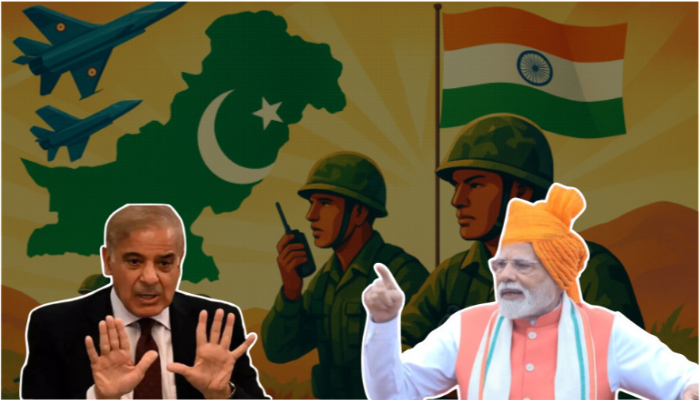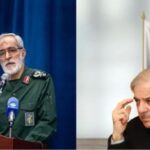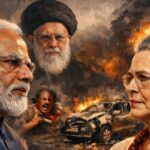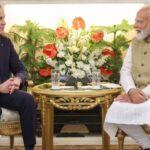Prime Minister Narendra Modi has sent a strong warning to Pakistan in response to the neighbour’s relentless nuclear threats especially after “Operation Sindoor” and suspension of the Indus Waters Treaty. “India has decided that it will not tolerate nuclear threats anymore, we won’t fall for any blackmail,” he declared from the ramparts of Red Fort on 15th August.
The prime minister asserted that India will treat terrorists and those who assist them as one and its armed forces would ruthlessly punish any future misadventure. “If the enemy dares to commit any more misadventure, the Indian Armed Forces will give them a befitting reply,” he outlined.
“What our forces achieved has not been witnessed in decades. We have set a new normal in tackling cross-border terrorism. I salute our brave soldiers who delivered a punishment for the Pahalgam attack far beyond the enemy’s imagination,” PM Modi stated while lauding the military action in Pakistan in the aftermath of killing of 26 Hindu tourists by Pakistan-sponsored terrorists.
“Destruction in Pakistan has been so massive that new revelations are made every day and new information comes out daily,” he further highlighted.
#WATCH | PM Narendra Modi says, “….Entire India was outraged, and the entire world was shocked by such a massacre (Pahalgam)…Operation Sindoor is the expression of that outrage….Destruction in Pakistan is so massive that new revelations are being made every day and new… pic.twitter.com/UJyLAHyOOH
— ANI (@ANI) August 15, 2025
The Indus Water Treaty with Pakistan was “unjust and one-sided,” according to PM Modi, who also maintained that India and its farmers had exclusive rights over the nation’s portion of the Indus river waters. He accused that the decades-old pact left Indian land and farmers parched while permitting rivers that originate in India to water “the fields of our enemies.”
“India has now decided, blood and water will not flow together. The people have come to realize that the Indus Waters Treaty is unjust. Water from the Indus River system has been irrigating the lands of the enemy, while our own farmers have suffered. What kind of agreement is this that has caused such immense loss to our farmers for the past seven decades,” he asked.
He reiterated, “The waters that belong to India will be used by India, for India’s farmers alone. We will not tolerate any arrangement that deprives them. This agreement is unacceptable to us.”
“Blood and water will not flow together. We do not accept the Indus Agreement in the national interest. The water of India’s rivers is only for the farmers of India.”
– PM Modi during Independence Day Speech
Pakistan will become a desert pic.twitter.com/PuB87trI2O
— Baba Banaras™ (@RealBababanaras) August 15, 2025
PM Modi’s warnings came amid nuclear threats from Prime Minsiter Shehbaz Sharif and Field Marshal Asim Munir. The latter vowed to demolish any infrastructure erected on the Indus Water channels that would stop water from reaching Pakistan and boasted that his country has an abundance of missiles, at an event during his recent visit to the United States.
He also threatened to take down “half the world” if Pakistan faced an existential threat in a future war with India. “We are a nuclear nation, if we think we are going down, we’ll take half the world down with us,” Munir tried to blackmail.
On the other hand, Sharif claimed that India will suffer grave consequences if the water is not released. “I want to tell the enemy today that if you threaten to hold our water, then keep this in mind that you cannot snatch even one drop from Pakistan. If you attempt such a move, we will teach you a lesson you will never forget. You will hold your ears and promise never to touch our share of water again,” he threatened.
Sharif insisted that there would be “no compromise” on Pakistan’s rights under international agreements, referring to the Indus waters as the country’s lifeblood. The comments followed an appeal by his foreign office for New Delhi to swiftly reinstate the Indus Waters Agreement to its regular operations.
1993 nuclear crisis between India and Pakistan
“We possess a nuclear arsenal and will strike India.” Pakistan has been blackmailing India and by extension, the global community with threats of a nuclear war to have its own way akin to a a spoiled and entitled brat for decades. Instead of conducting itself as a mature nuclear power, Islamabad takes advantage of its status to threaten New Delhi whenever it is called out for perpetrating terror and is met with a fitting response from the Indian armed forces.
The Islamic Republic cannot engage India on the battlefield, thus it resorts to terrorism and nuclear threats in a desparate attempt save face following its stinging defeats. The same rabidity was exhibited in 1993 when Pakistan had positioned nuclear warheads on F-16 fighter jets to attack India.
India had deployed five brigades of its most advanced attack unit, the Indian Army Strike Corps, fifty miles from the Pakistani border in the south and had gathered two hundred thousand troops, including paramilitary forces in Kashmir over months of rising tension. The larger and much more powerful much India had fought and already won three wars against Pakistan since 1947 till then.
From the Red Fort, PM Modi sends a strong message — Pakistan’s ‘nuclear bluff’ won’t work anymore.
Find out when Pakistan tried to pressure India by threatening nuclear weapons, in our detailed video. Watch the full story now on our YouTube channel. pic.twitter.com/WWkj1JrO3G
— OpIndia.com (@OpIndia_com) August 15, 2025
In the meantime, Islamabad openly stationed its main armoured tank regiments along the Indian border and secretly put its nuclear weapons stockpile on alert. Islamabad wanted to avoid a recurrence of the catastrophic two-week conflict in December 1971, during which it outmatched in both firepower and strategy and was fragmented by an Indian assault resulting in the formation of Bangladesh along with a humiliating surrender of over 93,000 soliders in Dhaka. This marked the largest surrender of troops since World War II.
“The American intelligence community, also operating in secret, had concluded by late May (1990) that Pakistan had put together at least six and perhaps as many as ten nuclear weapons, and a number of senior analysts were convinced that some of those warheads had been deployed on Pakistan’s American-made F-16 fighter planes,” reported The New Yorker.
It further conveyed, “The analysts also suspected that Benazir Bhutto, the populist Prime Minister of Pakistan, had been cut out of or had chosen to remove herself from the nuclear planning. Her absence meant that the nation’s avowedly pro-nuclear President, Ghulam Ishaq Khan, and the Pakistani military, headed by Army General Mirza Aslam Beg, had their hands, unfettered, on the button. There was little doubt that India, with its far more extensive nuclear arsenal, stood ready to retaliate in kind.”
President George Bush had then asked Robert M. Gates, a long-time Central Intelligence Agency (CIA) official who was then the White House’s deputy national-security adviser to fly to Islamabad and New Delhi on his behalf to mediate a truce between the two adversaries. Afterward, the latter managed to difuse the volatile situation with his intervention. The aforementioned episode clarified two things:
- Despite their fake bravado and chest thumping, Pakistan has always understood that it has no possibility of success against India in a conventional confrontation. Thus, terrorism along with the support of separatist movements and the incitement of unrest are its sole strategies to “bleed India by a thousand cuts.”
- Pakistan believes that its nuclear assets are the last remaining option available to the country for maintaining some leverage. It is aware that the world cannot bear such a dangerous escalation and hence exploits them impulsively to further its own jihadi agenda.
Islamabad’s fixation on its nuclear weapons to intimidate India
“Humne nuclear weapons Shab-e-Barat main chalane ke liye nahi rakhe,” “Pakistan ke nuclear weapons Eid ke liye nahi hein,” “Humare nuclear weapons dikhane ke liye nahi hein,” (Our nuclear weapons are not merely for our holy days, festivals our display), represent only a fraction of the many declarations made by Pakistan about using its nuclear assets to unsuccessfully instill fear in India.
Notably, certain sections (liberals and leftists) of India also parroted the same lines to thwart and prevent any military action against Pakistan. This absurdity was also mocked by PM Modi in 2019 when he stated, “What do we have then? Have we kept our nuclear bomb for Diwali?”
As India held the Indus Waters Treaty “in abeyance,” Pakistan Minister Hanif Abbasi claimed that their arsenal which has 130 nuclear warheads like Ghori, Shaheen, and Ghaznavi missiles is only for India. He added that India should “prepare for a full-scale war” if it dared to cut off Pakistan’s water supply.
“If they stop the water supply to us, then they should be ready for a war. The military equipment we have, the missiles we have, they’re not for display. Nobody knows where we have placed our nuclear weapons across the country. I say it again, these ballistic missiles, all of them are targeted at you,” he stressed.
Similarly, Pakistan Defence Minister Khawaja Muhammad Asif who made a joke of himself on international media declared that “nobody will survive” if a war broke out, in a veiled nuclear threat during “Operation Sindoor.” The man is a habitual offender and has previously threatened India on multiple occasions, including in 2016 when he stated, “Islamabad is open to using tactical (nuclear) devices against India if it feels its safety is threatened.”
Imran Khan, the former prime minister of Pakistan too threatened to start a nuclear war if the world did not take notice of Islamabad’s conflict with New Delhi over Kashmir. “It is imperative that the international community think beyond trade and business advantages. World War II happened because of appeasement at Munich. A similar threat looms over the world again, but this time under the nuclear shadow,” he wrote in an overwrought opinion piece for the New York Times in 2019.
The act of threatening India with a nuclear strike is rite of passage for the military and civilian leadership of Pakistan and thus far, no one has disappointed. This conduct, is of course, not surprising or shocking from a nation whose primary export to the world is jihad which its leaders like to call “dirty work at the behest of the US and West.” It celebrates terrorists as heroes and martyrs even in its national assembly, protects them like its pampered assets and employ terror as a state policy against other countries, specifically India.
India puts an end to nuclear blackmail after “Operation Sindoor”
India has repeatedly cautioned the terrorist state to limit its nuclear rhetoric including during “Operation Sindoor.” The former made a major shift in its security strategy on 10th May when New Delhi stated that it would now view any act of terrorism against the nation as a “act of war” and would react accordingly.
PM Modi further emphasized this point while addressing the nation on 12th May regarding the success of India’s military operation against Pakistan and its terror hubs. He also stressed that Pakistan’s era of nuclear blackmail has ended as India has embraced a new and more assertive policy towards its enemy.
He mentioned, “First, if there is a terrorist attack on India, a fitting reply will be given. We will give a befitting response on our terms only. We will take strict action at every place from where the roots of terrorism emerge. Secondly, India will not tolerate any nuclear blackmail. India will strike precisely and decisively at the terrorist hideouts developing under the cover of nuclear blackmail.”
The prime minister then conveyed, “Thirdly, we will not differentiate between the government sponsoring terrorism and the masterminds of terrorism. During Operation Sindoor the world has again seen the ugly face of Pakistan, when top Pakistani army officers came to bid farewell to the slain terrorists. This is strong evidence of state-sponsored terrorism. We will continue to take decisive steps to protect India and our citizens from any threat.”
This is not the first occasion that Pakistan has been taught a harsh lesson by the Modi administration. The same approach was evident during the 2019 Balakot airstrikes that occurred after the Uri terror attack. India’s consistent determination to enter enemy territory to hunt down its proxies and dismantle their terror infrastructure had already put Islamabad on the defensive.
However, “Operation Sindoor” illustrated that India not only has the capability to penetrate into Pakistan-occupied Kashmir but also to advance over 100 kilometers deep into its backyard in Bahawalpur, cognizant of Islamabad’s inclination to resort to its nuclear arsenal at the slightest provocation.
The demolition of terror centres and military installations by Indian forces has unsettled Pakistan, prompting the latter to amplify its nuclear threat. However, both India’s statements and actions have clearly established that the pitiful attempts to deter India from punishing those who massacre its people and spread terror on its soil have run their course and fail to affect New Delhi’s resolve to protect its citizens, borders and sovereignty as well as bring the culprits to justice.
The time of submitting dossiers and making repeated appeals to hand over dreaded terrorists without any military action against Pakistan, due to concerns over nuclear retaliation has long passed. “Pakistan should tone down its rhetoric. Any misadventure will have painful consequences, as we have shown recently,” as eloquently remarked by Ministry of External Affairs (MEA) spokesperson Randhir Jaiswal on 14th August.
The same sentiment was expressed by Director-General Military Operations (DGMO) Lieutenant General Rajiv Ghai on 11th May, following India’s successful attainment of the objectives of “Operation Sindoor” which led Islamabad to request a ceasefire. “We have thus far exercised immense restraint and our actions have been focused, measured and non-escalatory. However, any threat to the sovereignty, territorial integrity and safety of our citizens will be met with decisive force,” he had warned.
Pakistan which is unaccustomed to such a tough position from understands that its aggressiveness should only be confined to media and as India has warned, any miscalculation stemming from a false sense of confidence or an attempt to demonstrate nonexistent superiority will be met with significant repercussions that Islamabad would find very hard to bear.
Predictably, Pakistan is unlikely to change its ways and will persist in trying to harm India via terrorism. However, now its actions will be considered “act of war” and the country will be responsible for its long deserved and brutal end.












